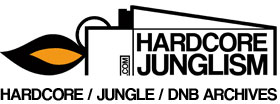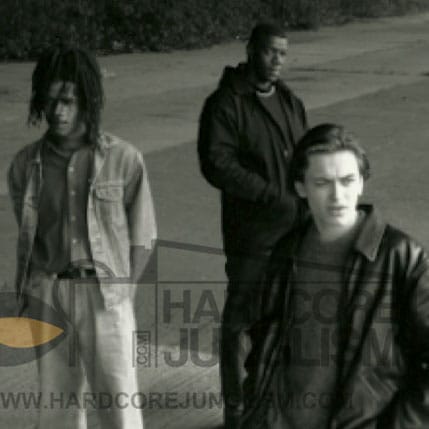Foul Play rank amongst the most fondly remembered acts from the rave scene from 1992-1995. Their début release, an independent E.P released on their own label caused ripples in the hardcore/jungle scene leading to Foul Play getting signed to seminal imprint, Moving Shadow and producing countless classic tracks and remixes plus an album. Hardcore Junglism had a chance to catch up with John Morrow, former group member who still makes tunes today under the Skeleton army alias….
Hi John thanks for taking the time to speak with us can we start by asking who were your earliest musical influences? And was it always firmly in your mind that you wanted to be a musician?
The first music I really loved as a kid was Hip Hop and Electro, I used to buy all the ‘Streetsounds’ albums on cassette before I got my first set of decks at 13. I was particularly into up-tempo Hip Hop like Miami Bass and starting getting into House around 87 when the ‘House sound of Chicago’ albums came out. As far as making music was concerned I’d always played around with it while I was still at school, I had a 606 drum machine and guitar foot pedal which had a four second sampler in it, so I’d sample loops, trigger them with the 606 and rap and scratch over the top. Just kid stuff really but it was the only thing I was ever really interested in.
What inspired you to make the transition from DJ’ing to production and what made you choose to go into the rave scene?
I never got seriously into production until myself and Brad hooked up with Steve Gurley in 92 but I’d been DJing in the rave scene for a couple of years prior to that. It was never a conscious musical choice, I was just out buying records every week and there were more and more records coming out that combined elements from all the stuff I loved, House and Techno records with Hip Hop samples and breakbeats etc. Plus I’d just turned 18 so I’d started going out more and playing in clubs just as the scene started blowing up.
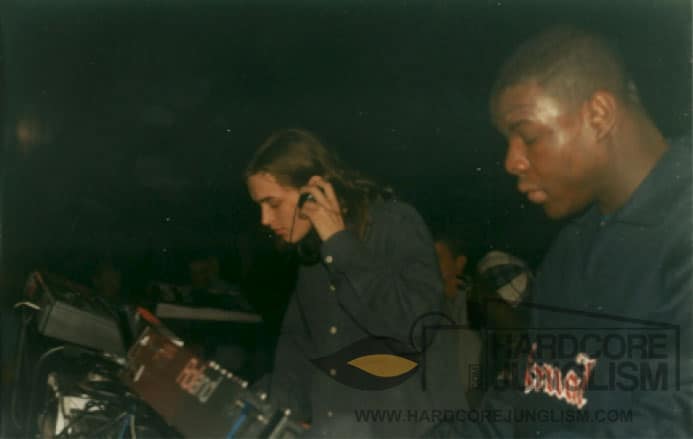
What were those defining tunes that drew you into rave music?
There are so many great records that came out late 90 / early 91 that were like nothing that came before them. The first Prodigy single (all 4 tracks but particularly What Evil Lurks), Beltram Vol 1 and 2, Outlander – Vamp, Manix – Special Request, Anything by Rhythm Section or Shut Up And Dance, and so much more.
How did you get your first “ 2 High” Dj’ing gig and which venues did you play at?
Well ‘2 High’ was Picton my MC and I. We were playing at a lot of parties and small raves around Northampton. One day Brad came up to us at a party we were playing at and told us he thought we were pretty good and he wanted to manage us. Brad was a bit of a face around Northampton at the time so we jumped at the chance, and true to his word we were playing all over the country within a couple of months for Helter Skeleter, Rezurrection, World Party and Fantasy FM at the Astoria.
What was it like DJ’ing at legendary pirate station Fantasy FM?
Unfortunately we never got to play on the station as it closed down before we started playing for them at the Astoria. DJ’ing for them was amazing though, playing to that many people alongside legends like Hype and DJ Rap when I was still only 18 was like a dream come true.
How did Foul Play initially come together, how and where did you guys meet up and decide you wanted to make the seminal tunes you are now so well known and loved for?
We used to put on nights in Northampton and Steve Gurley used to come over from Milton Keynes and DJ for us. One day he invited us over to his studio and after a few more visits we had the tracks that would become Foul Play Vol.1
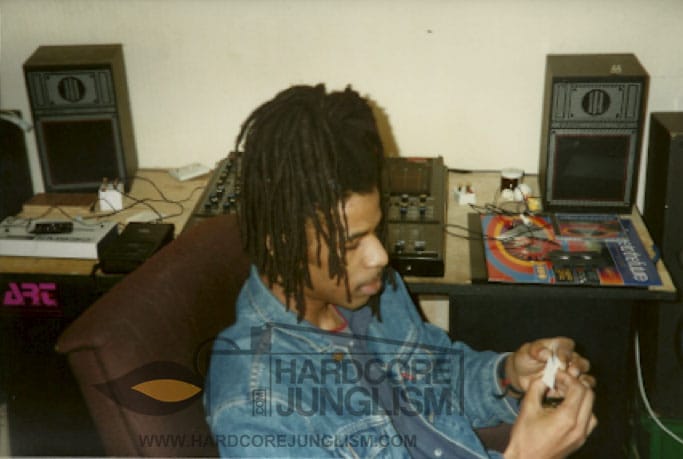
Has it been somewhat overwhelming seeing the positive feedback you get from your tracks?
Definitely, Back in those days we were really young and just took everything in our stride, hearing our music in a club and hearing a good crowd reaction was really cool, but now I’m older I really appreciate it more. When I see the comments from people about the music we made 20 years ago and how much it still means to them, it is overwhelming and I certainly don’t take it for granted, I’m really proud to have been a part of it all.
You took the bold step of setting up your own record label, Oblivion records to put out your initial releases, what made you choose this route as opposed to the norm of releasing white labels or trying to get signed? Also, what inspired the name for the label?
Oblivion was the name of the nights we put on in Northampton so was the obvious choice for the label and we already had the logo. We got the tracks mastered at JTS and they offered a deal which included pressing and label artwork etc., so we went for it. JTS was a popular choice in the rave scene; we met quite a few producers for the first time in there such as Total Science who were starting Legend at the time.
We understand that the 4 tracks on Foul Play Vol 1 were all made individually by members of the group which of the four tracks is yours?
Well me made them all together in the studio but each of us put our individual ideas forward for a track and had the final say on how it turned out. ‘Feel the vibe’ was mine, Ricochet was Steve Gurley’s, ‘The Alchemist’ was ‘Brad’s and ‘Ragatere’ was Picton’s.
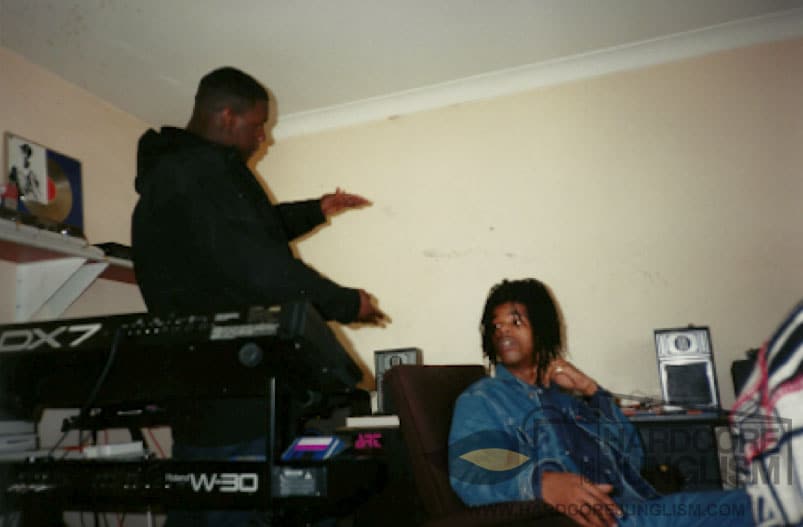
There was a 4th member of Foul Play at one point, who was that and what happened to them?
Yeah that was Picton who was the MC in 2 High and a partner in the Oblivion nights we put on. P was a bit of a wheeler dealer and being in the studio wasn’t really his thing but he was always the silent partner in Foul Play, was always with us back in them days and is still a mate of mine today.
Foul Play Vol 2 was the one that established you guys, it was also the final release on Oblivion, tell us a bit about how you guys put it together?
Well, Vol. 1 sold 1500 copies so we got busy working on a follow up, by then it was just Brad and Steve and I and we started putting more time in, in the studio. I think the quality of Vol 2 was head and shoulders above the first one as Brad and I started finding our feet and Steve was starting to excel as a producer. Often Brad and I would turn up at the studio with a load of samples and ideas and would throw a load of stuff at Steve who would seemingly effortlessly make everything work. It went on to sell 3000 copies and yeah it definitely started to establish us within the scene.
What was the process that went into putting together ‘Dubbing You’? We believe there’s a rather large sample in there.
Well there’s a few really, the vocal is obviously Barbara Roy and the middle section chord progression is lifted pretty much entirely untouched. We liked to have a more musical “Rushy” section in most of our tracks and those parts just worked for that. I’d like to think we were creative with our sampling though, and the way we fitted everything together in that track as with our other releases was never just stealing other people’s music for the sake of it. I’m hearing a lot of samples from Foul Play records these days so as they say “What goes around!”
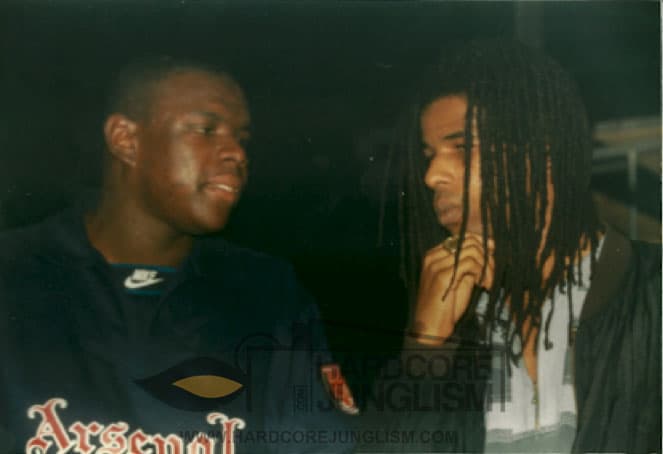
Asides from being on Moving Shadow, you also produced under the alias ‘4 Horsemen Of The Apocalypse’ which went out on Tone Def., tell us a bit about that, what’s behind the name and how come these tracks never came out on Shadow?
Well I met Yomi who owned Tone Def around the time we’d just signed for Moving Shadow and invited him to the studio to work on some music. Those tracks were always going to come out on Tone Def from the outset and I think Yomi came up with the name as there were 4 of us.
Who’s idea was it to reverse the “I’m Drowning” vocal which came up with the wicked result of making it sound like it was saying “In her” – I bet that made everyone sit up when that happened in the studio lol.
It was one of those happy accidents!, we sampled the ‘I’m Drowning’ vocal from ‘Tears’ and with the sampler we were using, if you kept your finger down on the key when triggering the sample it would automatically play the sample forwards, then in reverse straight after, so it just happened by accident and there was no way it wasn’t going in the track.
And how did you link up with Moving Shadow? How did it feel to be part of such a defining label of the golden era of DnB?
Well, we put my Nan’s phone number on the Oblivion releases so people could get hold of us and Si from 2 Bad Mice who was doing A&R for Moving Shadow at the time gave us a call. He liked Vol. 2 and asked if we had any new material he could hear, and luckily we had Vol. 3 ready to go. Obviously Moving Shadow was already a fantastic, well established label and when they said they wanted the tracks it was a no brainer.
Do you ever reflect back on what might have happened if Moving Shadow hadn’t reached out to you? Especially as Oblivion 003 was about to go the press with the full vocal version of ‘Finest Illusion’
Yeah definitely, we were really lucky with the timing of Simon’s call, as a week later we would have pressed Vol. 3 ourselves for Oblivion and things would have been very different. As you say ‘Finest Illusion’ was due to be on Vol. 3 but Rob Playford at ‘Moving Shadow’ decided to release it separately for legal reasons so we made ‘Open your Mind’ quite quickly to fill the space on Vol. 3 and it was probably the stand out track, and maybe would never have been made otherwise.
Tell us about Steve Gurley’s involvement in Finest Illusion as we understand he had a major input in the track
Yeah Steve made the vocal version of ‘Finest Illusion’ on his own. We had three tracks already for the E.P and Steve said “I’ve got this tune, maybe we could use it as the fourth track”. I can still remember when Brad and I first heard it, we were blown away. It was a piece of Steve Gurley genius, especially when you realize that because of a lack of sample time he had to make it as an instrumental and mixed the vocal on there straight from vinyl at the end, when recording it to DAT, very very clever.
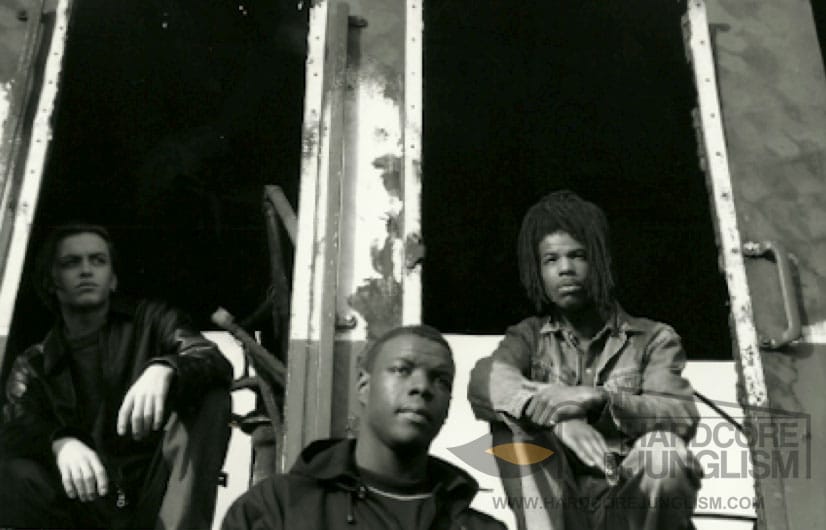
Things became quite prolific in 1993, you had a number of sought after remixes on Moving Shadow along with your own releases, how did you find the time and manage to keep things so fresh?
Well none of us had a day job, that helped, we were all young, were signing on the dole and we spent as much time in the studio as we wanted, also thanks to Steve being a studio Don we finished tracks pretty quickly, a couple of days tops, plus we were out every weekend so we knew what was going on within the scene, and we just managed to get on a roll.
Is there a certain formula you adhered to in your productions?
Not really, I think when you listen back to our tracks you can definitely see certain recurring themes. DJ friendly intros, a real emphasis on the first drop, a soulful or ‘rushy’ breakdown. All these thing added up to the Foul Play sound.
Of all the remixes you did, which one stood out for you and why?
That would probably be ‘Lord of the Null-Lines’. It was the first remix we did, so we didn’t think too much about it, we just did it pretty quickly, about three hours, and everything just seemed to click into place. Obviously it went on to do really well, so that day in the studio has always really stuck in my mind.
Is there a producer you always wished you had the chance to work with or remix one of their tracks?
Well if there was one producer I’d liked to have been in the studio with it would be Photek, for obvious reasons, but in the early days we’d always wanted to do a remix for Reinforced so were really pleased to finally get the chance with remixing ‘Sound of Music’ for Nookie’s album.
One of your biggest supporters was DJ Randall who also joined you to make a second remix of ‘Lords Of The Null Line’, how did you come together for the remix and what was it like working with him?
Yeah, one of the biggest buzzes was getting to spend time in the studio with people within the scene who we really admired such as Randall and Top Buzz. I remember with Randall, him and Brad used to speak a lot and he invited him over to the studio, I’m not even sure if the plan was to do a new remix at all, or just for him to do a VIP version to play out, but we did the new mix in a day, and ‘Moving Shadow’ jumped at the chance to release it.
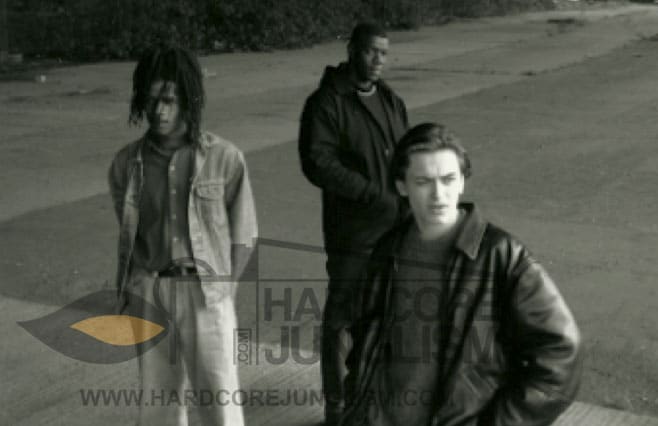
Where was your studio based initially in the early days and did you record from a different location once signed to Moving Shadow?
The studio was based over at Steve Gurley’s house in Milton Keynes and we worked there for the entire two years we were a trio. After Steve left the band, Brad and I worked at a bunch of different studios with, Rob Playford, Rob Haigh, Adam F, and Hyper-On-Experience amongst others until setting up our own studio in Northampton in 1995.
On the flipside to the original Finest Illusion on Section 5 is a track called ‘Screwface’, a markedly different track from your usual productions, what’s the story behind this?
We needed to put together a track pretty quickly to go on the flip of ‘Finest’ and I’d recently sat in front of the TV recording audio clips from ‘Marked for death’ so we decided to build a track around these. I suppose those clips did give the track a darker feel than our usual sound, which was of course a great contrast to the happy, uplifting feel of the A side.
Despite the major changes in the rave music sound post 92, you always stuck to a melodic sound as opposed to the prevailing ‘Darkcore’ was it that you were not so keen on the darker sounds?
I’m not sure it was ever really a conscious decision, we just made the music we liked, also the starting point for most of our tracks was a nice soul vocal sample, so our stuff usually ended up sounding pretty melodic and soulful.
Let’s talk about some of your most well-known and much loved tracks starting with ‘Open Your Mind’ how did it come together and is there any interesting anecdotes about it?
As I said earlier it was made pretty quickly to fill a space on Vol. 3 and ended up being the stand out track, so if we hadn’t got the call from Moving Shadow when we did, it would never have been made, and Foul Play might never have taken off the way it did.
Then there’s the remix of the same track which raised the bar even higher, where does that vocal at the start come from?
Like most of our tracks the vocal is from an 80’s soul record, in this case ‘Love so fine’ by Sahara. That remix was a conscious decision to make a track to start or finish a set with, and I think we got it just right, which is a good job because it’s a bitch to mix.
Music Is The Key is an amazing track that features Denise Gordon on vocals, how did you meet up with Denise and how did the track come together?
Brad and Denise were long time family friends and obviously she’s an awesome singer so there was never anyone else in mind to sing for us. Brad had written the lyrics and his initial idea for the vocal melody was along the lines of ‘Sweet Love’ by Anita Baker which I think you can hear, particularly in the first few lines. We recorded the vocal in a studio in Northampton and after a few back and forths we finished it in Steve’s studio in MK. The whole process took quite a while which partly explains why the flipside ‘Being with you’ which we had made already, ended up being on dubplate for nearly a year before it was released.
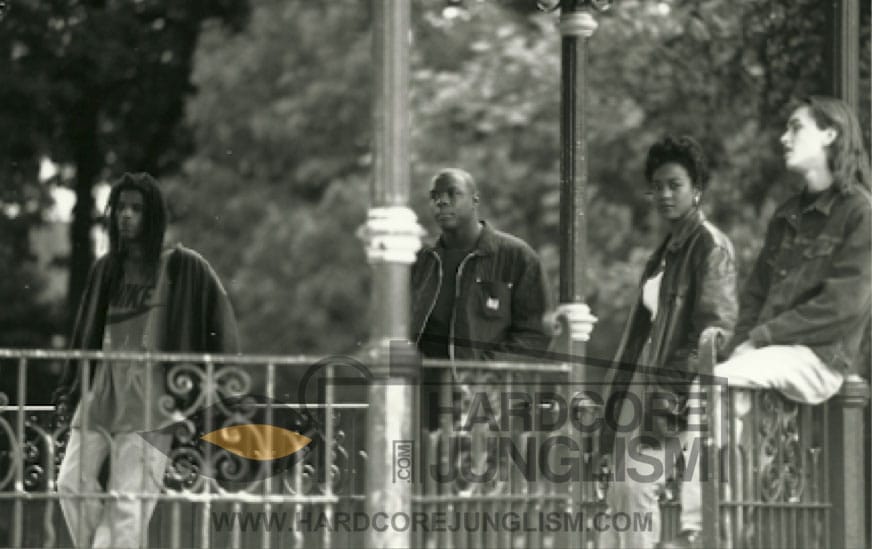
I remember when Music was the key was released there was not many tracks with a full vocal in them – Mostly due to equipment not being able to handle full vocal tracks, were there any issues you can remember making the track with hardware limitations?
Yeah certainly, because we recorded the vocal and did the arrangement in two different studios, in order to transfer back and forth we did it the old fashioned way, recorded it to tape and used a four track machine. To use a sampler would have been impossible with that much vocal because of the limited memory.
Of all the remixes you did, the most famous are ‘Lords Of The Null Line’ & ‘Renegade Snares’, do you recall being at the raves when they were played or hearing it on the radio, how did you feel at the time?
Yeah definitely, some of my best memories from that entire period are being out and hearing the tracks played and the crowd reactions. Particularly with Null-Lines, I remember being at the Sanctuary in MK just after the test presses had been given out, and literally every DJ played it. At the start of the night no-one knew it and after about the eighth play everyone in the crowd was going crazy and calling for rewinds. that was a very special night, definitely one of my highlights.
‘Being With You’ is another huge vocal track of yours, what was the inspiration behind this classic?
I think of all our tracks, it’s ‘Being With You’ that stands the test of time the best and is probably my personal favourite. It’s almost three tracks in one but still manages to flow, mainly down to Steve’s technical prowess in making an awful lot of samples work together. It’s probably the best example of the ‘Foul Play’ sound, and definitely a tune that’s a lot of people’s favourite.
All of the Foul play tracks were always full of different sounds and samples throughout did you have a big studio to work with back in the day?
No not really, studio gear was still pretty expensive back then, Steve already had a small set-up when we first started working with him, and by signing with ‘Moving Shadow’ we were able to buy some new bits including Rob Playford’s old Akai S1000 sampler.
Can you give us a rough idea of a kit list of what made up the Foul Play studio or studios?
Well the set-up changed quite a bit over the first couple of years but the kit we used included an Atari ST, Akai S1000, Yamaha DX7, Roland W-30 Workstation and later an Apple Power Macintosh 8100.
There was quite a lot of use of gating on your early tracks was this a conscious decision or just a new bit of studio gear getting battered?
Well, because of the limited amount of kit we had, we made the most of everything, Using the gate to create that on/off staccato sound was a particularly effective trick and yeah it does crop up a lot and is a bit of a trademark effect for us, just another example of a spot of Steve Gurley genius.
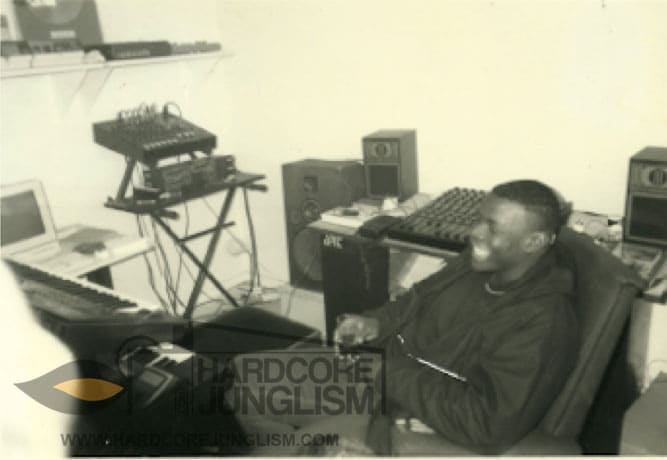
Tell us about your album ‘Suspected’, when did you decide to record an album or did Rob Playford ask you to put it together? Which are your favourite tracks from the album and why?
I think it was Rob’s idea for all the main artist’s on the label to try working on an album. By this time Steve had left the band and Brad and I were working at Alex and Danny’s (Hyper-on Experience) studio in Beccles, we had done the Stepper / Total Control single there which was pretty successful so we started putting together tracks for the album. As well as the Hyper-on guys we also worked on the album with Rob Playford, Rob Haigh (Omni Trio) and Adam F. My personal favourites on the album are ‘Nightmoves’ and the Omni Trio remix of ‘Music is the key’. Nightmoves was our first downtempo track and was done with Rob Haigh which was a great experience and you can definitely hear the Omni Trio influence in there, and of course his remix of ‘Music is the key’ is nothing short of amazing.
You were in the Moving shadow offices when Rob Playford & Goldie were making ‘Timeless’, any interesting stories from witnessing the album in the making?
Back then, the Moving Shadow office and studio was in Rob’s house in Stevenage. We’d be round there sorting out our own releases while Rob and Goldie were making what would become ‘Timeless’ in the studio which was the front bedroom. The back bedroom was the Moving Shadow stock room and was always our first port of call while Rob was too busy to notice a little friendly pilfering!. Of course we didn’t realize the significance of what was going on in that little semi in Stevenage, but that place was always full of people, Rob, Goldie, Si and Sean (2 Bad Mice), Caroline (label manager) and all the artists coming and going, all doing their thing in various rooms of the house, creating a little bit of history.
You also got into promoting events for a while under the name ‘Voodoo Magic’, any good memories from this experience? Who used to come down and DJ there?
Voodoo Magic wasn’t our night it was ‘Moving Shadow’s’ night, we just performed there a few times and generally wandered around like we owned the place in our Moving Shadow bomber jackets!, but seriously they were really great nights and a chance to catch up with everybody on the label. They were held at ‘Equinox’ on Leicester square and they were always rammed and the line-ups were a who’s who of the DJ and MC world. Another Moving Shadow triumph.
After the sad passing away of Brad and Steve Gurley moving on to do solo work, Foul Play came to an end, you produced under a couple of aliases like Skeleton Army where you produce some very fine Deep House & Johnny Halo where you produced some really nice funky/nu skool breaks, are you finished with DnB?
Well, never say never but I haven’t got any plans to go down that road at the minute.
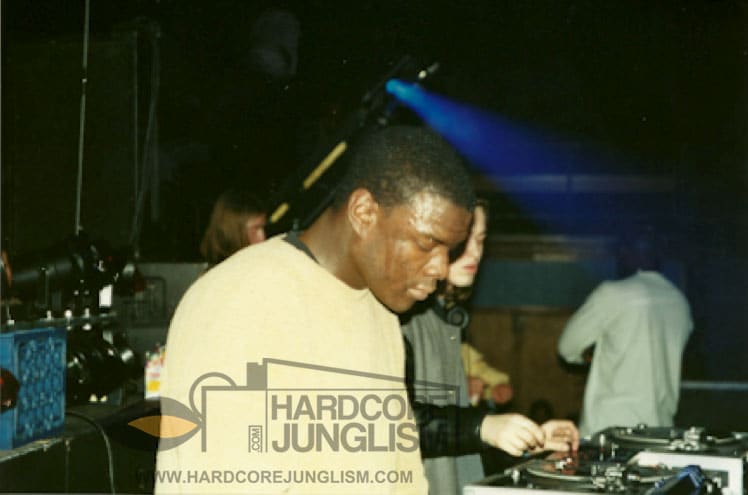
After Moving Shadow you briefly joined Partisan Records, released a second album ‘Field Of Action’ and also set up your own label, Panik Records in 1996, things didn’t go so well with these 2 ventures, why do you think that was?
It was soon after the launch of our label Panik that Brad got ill, and after he passed away I folded the label, it was a shame because we had big plans but I didn’t want to do it on my own. By the time I joined Partisan in 1998 Drum & Bass had gone through a major change and wasn’t the music that I knew and loved. I tried a lot of different styles whilst on Partisan, working with Neil Shepherd and our vocalist Shereen, but couldn’t really find my place in the scene anymore, having said that I really enjoyed my time on the label, working with all the guys who I knew from my Moving Shadow days and I’m still really pleased with some of the music we made in that period, particularly a vocal track called ‘Risk’ which was a big Fabio favourite. All in all I think the ‘Field of Action’ album was a fitting farewell from me to Drum & Bass.
Both you and Steve Gurley have stepped away from DNB production are you still in touch with each other?
I haven’t spoken to Steve in years but I’ve recently got hold of his number, so I’m hoping to catch up with him soon. If the right project came along I’d definitely like him to do a remix or something for me, I think that’d be pretty cool.
Any chance you and Steve can start making old skool as Foul Play again?
Doubtful!!!.
In all honestly though with the current interest in the old skool sound being bigger than it has ever been since the 1990’s would you consider making that style again in the future?
I’ve enjoyed listening to the new stuff that’s coming out, particularly the Manix (Click HERE for Manix LP)and Special Request albums, but I haven’t got the same love for that music that I used to have and besides, those guys are doing a far better job at it than I could. At the minute I’m really enjoying making House music as Skeleton Army.
Thanks John for speaking with us 🙂
Click HERE to check out Foul Plays tracks on our store
[raw_html_snippet id=”social1″]
